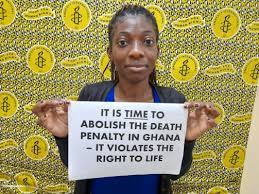
It’s been thirty years or so since Ghana executed anyone. Until this week, that was the good news. This week, in a “landmark vote”, Ghana’s Parliament voted to end the death penalty in all cases but high treason. To change that last hurdle, the Parliament will have to amend the Constitution. Nevertheless, this is a major step. There are currently 178 people on death row, six of whom are women. Most were sentenced to death because the law mandated the death sentence for certain offenses. Judges had no choice. As of this week, all of that changes. According to Amnesty International’s West and Central Africa Director Samira Daoud, “Today’s parliamentary vote is a major step by Ghana towards the abolition of the death penalty. It is also a victory for all those who have tirelessly campaigned to consign this cruel punishment to history and strengthen the protection of the right to life. Although a landmark decision, the total abolition of this draconian punishment would not be complete without revising the Constitution, which still provides for high treason to be punishable by death.”
Over the last ten years, the abolition of capital punishment has swept across sub-Saharan Africa. Benin, Burkina Faso, Central African Republic, Chad, Equatorial Guinea, Guinea, Madagascar, Republic of Congo, Sierra Leone and Zambia abolished the death penalty. In the past five years, Sierra Leone, Burkina Faso, Central African Republic, Equatorial Guinea and Zambia banned the death penalty. Twenty-nine African countries have abolished the death sentence. Since Ghana had not executed anyone for over ten years, the United Nations labelled it a de facto death penalty abolitionist, but Ghanaian politicians, and a majority of Ghanaians in every poll, thought that while that was fine, it wasn’t and isn’t enough.
Six of those on death row are women. Amnesty International Ghana and allies have argued, for years, that [a] the death penalty in and of itself had to be abolished and [b] that the death penalty had particularly catastrophic consequences for women, both for women on death row whose physical surroundings amounted to torture and for women partners of men on death row, who suffered severe deprivation. This week, Ghana’s Parliament heard their call.
Francis-Xavier Kojo Sosu, the Ghanian MP who tabled the bill, said, “On death row, prisoners woke up thinking this could be their last day on earth. They were like the living dead: psychologically, they had ceased to be humans. Abolishing the death penalty shows that we are determined as a society not to be inhumane, uncivil, closed, retrogressive and dark. It opens the way to further realization of a free, open, progressive, inclusive and secure society instead, and reflects our common belief that the sanctity of life is inviolable.” Imagine our common belief that the sanctity of life is inviolable. This week, Ghana has.
(By Dan Moshenberg)
(Image Credit: Amnesty International)